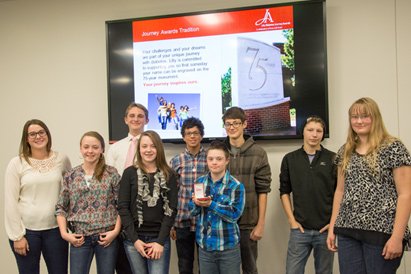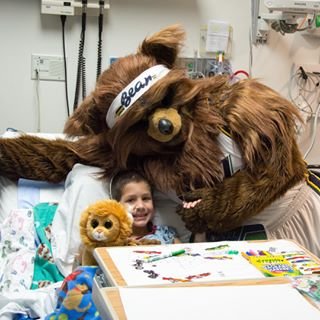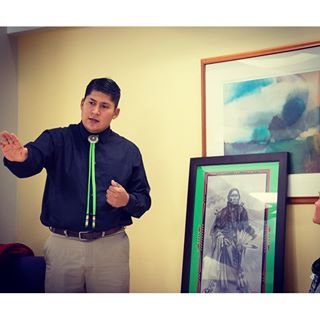
Patients celebrate 10 years of living with Type I Diabetes
Last week, 21 patients and their families gathered together to celebrate an important milestone–their 10 year anniversary of living with Type 1 Diabetes.
In Type 1 Diabetes Mellitis, formerly called Juvenile-Onset Diabetes, the pancreas does not make insulin. This means the body cannot use glucose as a source of fuel. It is a chronic disease that must be managed through meticulous monitoring of insulin, diet, and activity.
This diagnosis was a death sentence until the early 1920s when commercially available insulin was introduced. Through continued improvements in insulin technology, patients can now expect to live long and healthy lives–albeit challenging.
In recognition of the constant challenges these patients face, our Diabetes Program together with Lilly Diabetes held a celebration to honor their respective journeys.
Fighting Illness with Bravery

Brayden Butters speaks about overcoming obstacles.
“You all are so brave,” said Mary Murray, Director of Primary Children’s Diabetes Program. “You take Diabetes with you everywhere you go.”
Brayden Buttars, a high school senior and longtime patient, also mentioned bravery as an important tool in taking on his disease. Brayden was diagnosed just before his fifth birthday and has gone on to become a 4.0 student, rugby player, accapella singer, and ballroom dancer at Herriman High School. He said that although Diabetes could be used as an excuse not to live life to the fullest, “you can never let it get in the way.”
A Parent’s Journey with Diabetes
The event also honored the parents’ journey. Rita Sutton, whose son was diagnosed at just 17 months old, spoke about the challenges she faced early on. She spent four days in the hospital with Ethan learning how to count carbs and prepare correctly dosed food. She thought, “I don’t know how we’re going to survive this.”
In the beginning, she said she only knew how to correctly dose three different meals. An important realization for her was that she wasn’t going to “get it perfect.” She also realized that her view of Ethan’s disease would inform his own perception. It was then that she started to appreciate the “highs and lows” they experienced. Most importantly, she said, they now recognize the anniversary of Ethan’s diagnosis as a celebration of his ability to live a healthy life. She added, laughing, that they usually celebrate with cake–and insulin.
About the Author
Share This Article
Search Our Blog
Our Instagram
 primarychildrens
206
Likes
1
Comments
primarychildrens
206
Likes
1
Comments
 primarychildrens
223
Likes
primarychildrens
223
Likes
 primarychildrens
249
Likes
2
Comments
primarychildrens
249
Likes
2
Comments
 primarychildrens
401
Likes
5
Comments
primarychildrens
401
Likes
5
Comments
 primarychildrens
327
Likes
2
Comments
primarychildrens
327
Likes
2
Comments
 primarychildrens
306
Likes
8
Comments
primarychildrens
306
Likes
8
Comments
 primarychildrens
149
Likes
primarychildrens
149
Likes
 primarychildrens
143
Likes
1
Comments
primarychildrens
143
Likes
1
Comments

Recent Posts
- Pediatric Liver Transplant Program Celebrates 200 Lives Saved and 20 Years December 30, 2015
- Is it the Cold or the Flu? December 18, 2015
- Play it Safe Outside this Winter December 15, 2015
- 10 Tips for Choosing Safe Toys this Christmas + [Infographic] December 10, 2015
- The Air We Breathe: Protecting Your Kids During an Inversion December 3, 2015
Our Most Popular Posts
 Pediatric Liver Transplant Program Celebrates 200 Lives Saved and 20 Years 48 views
Pediatric Liver Transplant Program Celebrates 200 Lives Saved and 20 Years 48 views  Celebrating the First X-Ray and Radiology’s Contributions to Children’s Health Care 13 views
Celebrating the First X-Ray and Radiology’s Contributions to Children’s Health Care 13 views  Groundbreaking Research Studying Cancer in Elephants Spurs New Funding for Childhood Cancer 12 views
Groundbreaking Research Studying Cancer in Elephants Spurs New Funding for Childhood Cancer 12 views  Six Ways Child Life Specialists Improve Your Child’s Hospital Stay 11 views
Six Ways Child Life Specialists Improve Your Child’s Hospital Stay 11 views  On Childhood Cancer: Perspectives of a Pediatric Oncologist 9 views
On Childhood Cancer: Perspectives of a Pediatric Oncologist 9 views  “It Takes an Army of Heroes . . . ” A Parent’s Perspective on Tragedy 9 views
“It Takes an Army of Heroes . . . ” A Parent’s Perspective on Tragedy 9 views  Why Kids Shouldn’t Wear Bulky Coats in Car Seats 9 views
Why Kids Shouldn’t Wear Bulky Coats in Car Seats 9 views  A Guide to Flying with Special Needs Children 8 views
A Guide to Flying with Special Needs Children 8 views ![10 Tips for Choosing Safe Toys this Christmas + [Infographic] 10 Tips for Choosing Safe Toys this Christmas + [Infographic]](../wp-content/uploads/wordpress-popular-posts/4452-featured-15x15.jpg) 10 Tips for Choosing Safe Toys this Christmas + [Infographic] 8 views
10 Tips for Choosing Safe Toys this Christmas + [Infographic] 8 views  Think BIG on #GivingTuesday and Support Childhood Cancer Research 8 views
Think BIG on #GivingTuesday and Support Childhood Cancer Research 8 views
Archives
- December 2015 (5)
- November 2015 (8)
- October 2015 (8)
- September 2015 (2)
- August 2015 (1)
- July 2015 (3)
- June 2015 (2)
- May 2015 (2)
- March 2015 (3)
- February 2015 (2)
- January 2015 (2)
- November 2014 (1)
- October 2014 (1)
- September 2014 (3)
- August 2014 (2)
- July 2014 (4)
- June 2014 (2)
- May 2014 (4)
- April 2014 (6)
- March 2014 (4)
- February 2014 (1)
- September 2013 (1)
- February 2013 (1)
- June 2012 (1)















Add comment